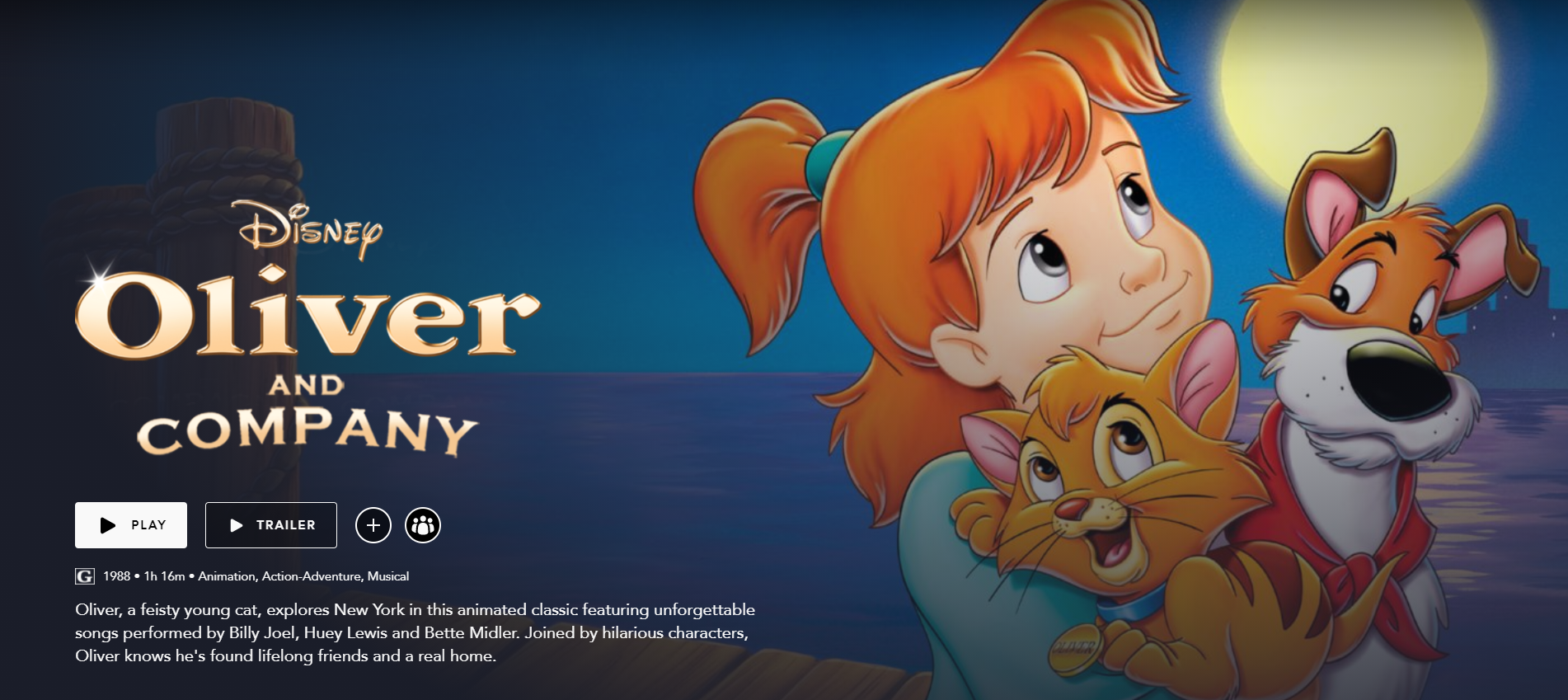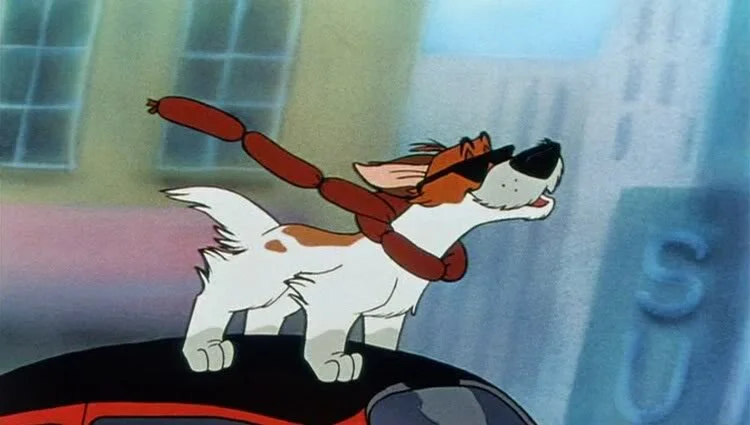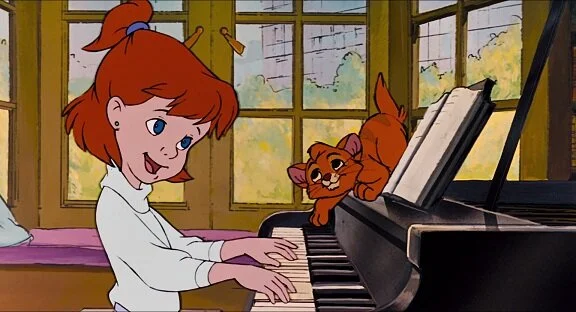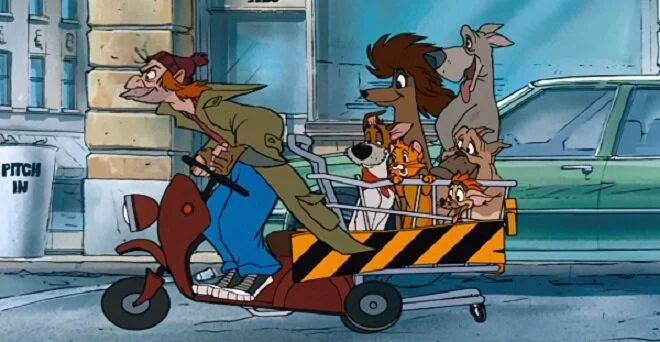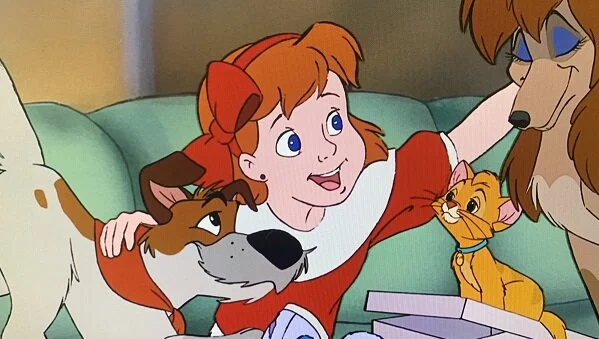Review: Oliver and Company (DMC #83)
We’re back with another animal movie this week! Last night we watched Oliver and Company, the 83rd film in our challenge. Loosely based on Charles Dickens’ novel Oliver Twist, this animated film takes several creative liberties with the source material. Our synopsis is below if you didn’t watch along with us last night or need to catch up, otherwise skip ahead to the review!
Synopsis
On Fifth Avenue in New York City, several kittens are left in a cardboard box to be adopted. All of the kittens are adopted except for an orange tabby, in spite of the seller reducing the price to “free.” The tabby is left alone in the box, and when a rainstorm destroys the box, he is nearly washed into a sewer drain. The kitten finds shelter on the tire of a parked truck and sleeps. The next morning, the owner of the truck starts it up and startles the kitten. The kitten wanders the streets of the city looking for someone to adopt him, but is unsuccessful. Attracted by the smell of hot dogs, the kitten tries to steal some from the vendor and catches the attention of a street mutt named Dodger. Dodger offers to help the kitten steal the hot dogs, and does so by barking at and chasing him, forcing the kitten to distract the hot dog vendor long enough for Dodger to steal them. The kitten meets up with Dodger, but Dodger goes back on their deal and flees while the kitten tries to chase him down. Eventually, the kitten pursues Dodger to a barge, where Dodger goes into a hideout below the docks and shares the hot dogs with a gang of fellow dogs: Tito, a Chihuahua; Einstein, a Great Dane; Rita, a Saluka; and Francis, a Bulldog. While Dodger recounts the story of how he got the hotdogs as if the kitten had been a terrifying monster, the kitten accidentally falls into the hideout and startles the dogs. When they realize it’s just a kitten, they are annoyed but choose not to harm him. Instead, they poke fun at Dodger for embellishing the story. Soon, the owner of the dogs, a petty thief named Fagin, arrives home. Fagin is indebted to Sykes, a cruel, ruthless loan shark and criminal. Dodger and the other dogs collect items each day for Fagin to then sell to pawn shops in the hopes of getting enough money to pay Sykes back, but the items are usually worthless. Fagin laments that he doesn’t have the money to pay back his loan to Sykes, and he finds the kitten among the day’s worth of items. Just then, Sykes arrives with his Dobermans, Roscoe and DeSoto. Fagin tries to appease Sykes with the items the dogs brought that day, but Sykes refuses the “garbage” and gives Fagin an ultimatum; repay the money in three days, or else. Meanwhile, Roscoe harasses Fagin’s dogs, and attempts to flirt with Rita. DeSoto sniffs around the barge and finds the kitten, who scratches the dog’s nose when DeSoto threatens to eat him. Roscoe and DeSoto attempt to attack the kitten, but Dodger and the dogs defend the kitten. Before anything else happens, Sykes calls his dogs back to his car, but not before his dogs threaten the group with vengeance. Fagin returns to the barge and feels hopeless. When the dogs go to comfort him, Fagin regains a bit of joy and asks who scratched DeSoto’s nose. He is formally introduced to the kitten and invites him into the gang. That night, the kitten snuggles up with Dodger to sleep.
The next day, Fagin sets out into the city with the dogs and the kitten, setting them on a task to look for more goods he can sell at a pawn shop. The gang shows the kitten how they do their business, and eventually spot a fancy limousine that they deduce belongs to a wealthy family. The limo is driven by Winston, butler to the Foxworth family, who is taking care of their daughter, Jenny, while her parents are away on a business trip in Europe. As Jenny sits in the backseat and reads a letter from her parents, she is saddened to learn that they likely won’t be back home in time to celebrate her birthday. The dogs stage a very elaborate and theatrical ruse by having Francis pretend he was hit by the limo. Winston stops the car to check on Francis while Tito and the kitten slip inside in order to try stealing the radio for Fagin. The kitten accidentally starts the car when he sees someone sitting in the back seat, causing Tito to accidentally be electrocuted while he bites at some wires. Tito and Francis manage to escape, but the kitten is tangled in the wires, only to be rescued by Jenny. At the Foxworth residence, Jenny makes an elaborate meal for the kitten, whom she decides to name Oliver, and places the food in a large, fancy bowl. Winston is apprehensive about taking in Oliver, fearing that Jenny’s parents won’t approve, nor that the family’s prize-winning show poodle, Georgette, will like Oliver. He goes to wake Georgette, who pampers herself before going downstairs. She finds to her shock that Oliver is eating out of her bowl. Georgette takes an immediate dislike to Oliver, but Jenny hopes the two will become friends. Back on the streets, the dogs worry for the kitten’s safety and make a plan to rescue him. However, Jenny and Oliver begin to bond; they visit Central Park together and Jenny shares her ice cream with Oliver. She buys him a collar with a license and a new bowl, both with his name on them. That evening, they fall asleep together in Jenny’s bed. The following day, Jenny leaves for school and the dogs hang outside the home discussing their plan. Einstein rings the doorbell while Francis lays on the entry stairwell and pretends to be injured. The other dogs hide when Winston comes out to check. When he leans in closer to Francis, Francis licks Winston and runs away while the butler gives chase, leaving the front door open. The gang sneaks into the house and Francis manages to follow, where they close the door behind them and lock Winston out. They meet Georgette, who at first is scared that she’s about to be dognapped, but is then insulted when Dodger tells her they’re not after her. Tito attempts to flirt with Georgette, much to her annoyance, and she’s just about had enough when Dodger reveals they’re looking for a cat. Georgette makes up a story that Oliver is miserable and wants to go back to his friends. As Winston sneaks back into the house via a window, the dogs steal Oliver back and return to the barge. There, Oliver says he is happy to see them but is upset they took him away from Jenny. Dodger gets upset as he thinks Oliver is ungrateful, but lets him leave anyway. As Oliver attempts to go, he is picked up by Fagin, who sees Oliver’s collar and realizes he has been taken in by a wealthy owner. In desperation, Fagin plans to hold Oliver for ransom and force the owner to provide the money he needs to pay back Sykes. He begins writing a note to the (presumably male) owner.
The anonymous ransom note is taken to the house and stuffed in the mailbox. Later, Jenny returns home and is dismayed that she can’t find Oliver. She finds the note and tells Georgette they they will get Oliver back, much to Georgette’s shock. Fagin tells Sykes of his plan, who at first is annoyed that Fagin doesn’t have his money, but then becomes interested after hearing Fagin out. A bit later, Fagin waits at the pier for what he hopes is the wealthy man, but only Jenny (along with an exhausted Georgette) arrives. Fagin is disheartened to learn Jenny is just a little girl and only has a piggy bank. When Jenny begins to cry, worried for Oliver’s safety, Fagin’s guilt and conscience win out, and he pretends to find Oliver in a pile of trash. He returns Oliver to Jenny and even looks happy to see them reunited. However, Sykes, watching from a distance in his car, suddenly drives towards Jenny and kidnaps her. He tells Fagin to consider their loan closed, as he plans to hold Jenny for ransom and force the Foxworths to pay him instead. Sykes takes Jenny back to his warehouse and ties her up while Roscoe and DeSoto circle her threateningly. Oliver is desperate to save Jenny. Dodger and the gang of dogs promise to help him. At the warehouse, Sykes speaks with Winston over the phone and tells him to tell Jenny’s parents to pay up if they want to see their daughter again. Einstein, Francis, and Tito distract Sykes and manage to get him away from Jenny long enough for her and Oliver to be reunited. Dodger asks Tito to take care of some electrical equipment that will allow them to rescue Jenny, but Tito at first refuses. Georgette flirts with him to get him to comply. Just as Sykes and the Dobermans return, Jenny is hauled up and away by a hook and is untied. She, Oliver, and the dogs nearly escape, but are cornered by Sykes and the Dobermans. Just as Sykes is about to order Roscoe and DeSoto to attack, Fagin barges in on his scooter and rescues everyone. Sykes gives chase in his car, and Fagin speeds down into the New York subway, but Sykes still follows them. During the chase, Jenny is thrown onto the hood of Sykes’ car, but Oliver jumps over to help her. Oliver is nearly attacked by Roscoe and DeSoto, so Dodger jumps over to Sykes’s car and fights off the Dobermans, who fall off the car and are electrocuted by the train tracks below. While Fagin saves Jenny, Tito drives the scooter as they emerge onto the Brooklyn Bridge. An oncoming train hurtles towards them, and Tito manages to steer the scooter onto one of the bridge’s cables, escaping the train unharmed. Distracted by fighting off Dodger and Oliver, Sykes sees the train too late and crashes his ca into the train. Dodger emerges with Oliver, who is feared to be dead until he meows softly at Jenny. Everyone is reunited and Jenny embraces all the dogs, except for Georgette, who is shown to be in great shock after the chase. Later, Jenny celebrates her birthday with the animals, Fagin, and Winston. Winston receives a call from Jenny’s parents saying they will be home the next day. Jenny warmly tells Fagin goodbye as he is about to leave with the dogs. Tito is asked to follow Georgette up to her room, and she says that with a bath and a bit of grooming he could become a good mate for her. Tito is then later seen trying to run away from Georgette, having second thoughts about her after all. Oliver opts to stay with Jenny, but tells Dodger he will visit from time to time. Fagin and the dogs climb onto his scooter and drive off, with Oliver, Jenny, and Winston watching.
Thoughts Before Watching
Kevin: This is one of those Disney films where I like the music more than the actual story. I almost never skip any song on the soundtrack when I’m listening to it, and my siblings and I usually enjoy singing along to “Why Should I Worry?” I’m sure the first time I heard the song (and thus was introduced to the movie) was on an old Disney Sing-Along VHS, and I’ve been hooked on the music since. With that said, I’ve seen this enough times that I remember the plot, so there must be something about the story I like that keeps me coming back to it. Guess we shall see!
Megan: I have only seen this film maybe two times prior to this viewing. The last time I saw it was when Kevin suggested we watch it while I was living in New York. Personally, I think the film is just okay. It has some good moments with songs like “Why Should I Worry?” and “Good Company,” and I enjoy seeing all the iconic NYC locations that I’ve been to. Beyond that, however, there’s not a whole lot here that draws me back to this film. I’m not quite sure why, but I’m sure I’ll be able to better articulate it after this viewing.
Thoughts After Watching
The music’s definitely better, but there’s still a decent story here
Kevin: This was the studio’s first animated musical since The Many Adventures of Winnie the Pooh (or Robin Hood, if we don’t include Winnie the Pooh since it’s an anthology of previously released cartoons). As much as I may like some of the films released during the Bronze Age, Robin Hood in particular, the music in the Disney animated catalog during this era hasn’t been all that great. Though I admit that I’m not the biggest fan of the music from the Silver or Golden Ages either, they had some punch to them and are at least sometimes fun to sing along to. The music in Oliver and Company is a return to the kind of music that helped define Disney’s earlier films. Like I said in our before thoughts, I rarely skip any of the songs on this soundtrack. “Once Upon a Time in New York City” is a nice jazzy tune to open with in spite of the sad overtone and animation that accompanies the song (poor Oliver nearly getting washed down a sewer is hard to watch). “Why Should I Worry?” is absolutely fun to bop to, “Streets of Gold” is a banger I can dance to, and “Good Company” is a totally sweet and buttery tune that I can’t help but love just because it’s such a tender song. The only song I would possibly skip is “Perfect Isn’t Easy”, which is a bit of a shame because the animation during the song is incredible. Of course, what helps the music is that they’re written and performed by some big names in the business, a decision made by Jeffrey Katzenberg. Some of the songwriters include Barry Mann, Howard Ashman, and Barry Manilow, and the performers include Huey Lewis, Billy Joel, Ruth Pointer, and Bette Midler. This decision would foreshadow some of the creative choices later made during the Renaissance films, where many of the characters were often voiced by some other big (or at least more well known) actors and/or singers, many of whom had experience in theatrical productions, including on Broadway. These choices would bring a sense of “star power” to Disney’s films and is partly why many of the Renaissance films have a Broadway sense of style to them. The only downside of the songs is that they don’t flow very well for a soundtrack, at least not to me. They’re good as individual pieces of music, but as a whole, the soundtrack feels disjointed. I think this is because each song had its own writing team, instead of the usual choice where a single writer or team writes the all the music. Later films would use the same writer(s) for all the songs, so those soundtracks would feel much more cohesive.
After watching this, there really wasn’t anything new about the story that I discovered. I would love to hear Megan’s thoughts on this as a writer, but for me, I think it’s just a very basic feel-good story with a bit of action and drama thrown in. It’s fun to watch Oliver pal around with Dodger and his gang of street dogs, and it’s heartwarming to watch the montage of Jenny and Oliver bonding together. Sykes is one the weakest Disney villains, but he does have some frightening moments especially after he kidnaps Jenny, and the attempt to save her has some pretty good action, culminating in a chase sequence that sees the heroes win and the bad guy lose. Again, it’s very basic and not at all groundbreaking, but I think it just works. According to folks more familiar with the original novel, the movie has almost no similarity to the novel save for the characters’ names. I could see why fans of the novel would probably not like just how loosely adapted the movie is, and I can respect that. For me, the appeal of this film is just that it has that feel-good element. The characters are mostly likable, especially the diverse gang of dogs, and seeing everything work out for Oliver is satisfying.
Megan: The story arc is definitely there. With Oliver as our protagonist, we see him go from a bumbling kitten who’s afraid of the world that abandoned him on his own, to a brave kitten who’s willing to fight to keep the loving home he’s found with Jenny. Though the film may take some creative license with the original tale of Oliver Twist, the major turning points of the story are still there. Oliver is still an orphan with a rough start in life, who unwittingly falls in with Dodger and a band of thieves. When Oliver’s first job as a thief goes wrong, he finds himself in a loving home where he’s well-cared for, but is soon kidnapped from that life by the gang of thieves. Through a series of events, Oliver is then reunited with his loving adoptive family. Of course, there are many differences (the original tale is quite a downer, which wouldn’t fit well with the Disney brand), but the overall structure of the story is there. The struggle for me, at least, is not that the story’s structure or character development is lacking, but more that I have a hard time connecting with these characters. Part of it is my rule-following inner child who finds it hard to side with criminal characters (Aladdin being the one exception), but the bigger issue, for me, is that this film doesn’t offer great female characters to root for.
Damsels and vixens
Megan: This film only has three named female characters: Jenny (the little girl), and the dogs, Georgette and Rita. With three, you might be thinking “this film has to pass the Bechdel test!” But, alas, you’d be wrong. The only time two named female characters speak to each other is when Rita asks Georgette about the male dog “Rex” in one of Georgette’s photos. Sure, Jenny says things to Georgette, but Georgette, being a dog who can only speak to other dogs, never says anything back to Jenny, so it remains one-sided. There isn’t much range in these female characters, either. There’s basically two options: cute little girl who’s a damsel in distress, or a vixen of a dog (Rita is attractive without needing to prove it, while Georgette is far more obsessed with her appearance and has literally won awards for it). Meanwhile, among the male characters, we have a dutiful parental-figure butler (Winston), a dunce (Einstein), a fan of the dramatic arts (Francis), a feisty fighter (Tito), a street-smart smooth-talker (Dodger), a naïve orphan (Oliver), a timid and homeless thief (Fagin), and dastardly villains (Sykes and his Dobermans). Why do all the boys get to have variety, but girls get stuck into one of two stereotypical boxes? It’s no wonder I found this movie hard to like when I was a kid. The only girl I identified with was Jenny, yet, despite (or because of) her valiant effort to rescue Oliver mostly on her own, Jenny falls into the damsel in distress trope. Once again, a female character becomes the object at stake between two male characters, and requires rescuing from the heroic male character(s). Boring!
Megan: Georgette doesn’t improve things much. She actually expects to be “dognapped,” and then is actually insulted when it turns out she’s not being dognapped! Like…what?! What woman ever wants to be kidnapped? How twisted is that?! Even setting that element of the story aside, Georgette is still problematic in how she represents all the societal pressures of unattainable beauty. When she first wakes up, she looks horrid, but with a bit of primping, she “magically” transforms into the most attractive version of herself (which also is a hypersexualized version of herself, with her poodle fluff on her chest made to look like breasts—at one point even appearing “naked” without them). The film makes it clear that Georgette’s beauty is what has won her loads of trophies, and it’s presumed that those trophies (and the wealth of her owners) are why she is treated to a pampered lifestyle. Now, I for one have never identified with Georgette (she’s so mean to cute little Oliver, after all), yet even if kids don’t identify with Georgette, it’s yet one more exposure to this idea that women are only beautiful, sexy, or desirable if they wear makeup and spend hours forcing their hair into the perfect style. The subliminal message is clear: a woman’s only value is in her beauty. Not exactly the takeaway you want.
Megan: Rita, too, falls into this trap. She’s drawn to be a very attractive dog. Even if Rita doesn’t obsess about her appearance in the way Georgette does, she’s still wearing eye shadow. Rita’s is a sexy confidence of knowing she looks good without even trying, which I’ll admit, I like more than the Georgette approach. Still, Rita doesn’t get to shine outside typical gender stereotypes. Though she’s “one of the boys,” as the only female among the gang, it falls to her to be the “motherly” figure when Oliver joins the group. Rita is the one who winks at Oliver to let him know he’s safe when he first appears, and she’s the one who questions whether they should really take Oliver from his new and very comfortable home when he seems so well-cared for there. In typical sexist fashion, none of the male characters listen to Rita’s voice of reason, and they kidnap Oliver from Jenny’s home anyway. In fact, this entire film has an issue with male characters not listening to or disregarding what the female characters say. In addition to the gang not listening to Rita, Winston tries to put off Jenny’s requests to keep Oliver, and Winston also ignores Georgette’s barks when she tries to alert him that something is wrong. The one time a female voice is genuinely listened to is when Fagin has a change of heart when Jenny tells him about how she’s trying to find Oliver. However, in listening and responding to Jenny’s story, Fagin ultimately imperils Jenny, as she’s immediately kidnapped by Sykes, who completely ignores Jenny’s pleas. If you’re a female character, this is not a good film to be in.
The trouble with the boys
Megan: The male characters don’t help this film much, either. Dodger and Tito are both womanizers who never miss an opportunity to sexually objectify and flirt with female dogs. Tito has the added problem of being a racist Mexican stereotype (much as the chihuahua in Lady and the Tramp was). While Kevin and I were watching, we noted that Dodger and Tramp would get along well, seeing as they’re both streetwise dogs who seem to flirt with the ladies, but where Tramp managed to redeem himself and showed that he had more than one dimension to his character, we really only see one side of Dodger. Sure, he lets Oliver snuggle up to him, but that’s the only time we see him soften. The rest of the time, it’s toxic masculinity all the way, showing how tough he (and most of the other male characters) can be. Fagin presents a different issue all together. He’s a man driven by desperation to do terrible things, and while the film wants us to like him, I really struggle with it. Is it just that he’s a criminal? Is it because the animators chose to draw him as unattractive? Is it because he spends most of the film groveling to Sykes instead of standing up for himself? Is it that he doesn’t have a strong enough “save the cat” moment when we first meet him? It’s hard to point to any one thing, so maybe it’s all the things that ultimately make him an unlikable character for me.
Money may not buy happiness, but it does bring security
Kevin: Have we discussed this theme on the blog before? I’m sure at some point we have, so hopefully this isn’t tiresome by now. Anyway, since Megan and I tasked ourselves with looking at these movies more analytically, I have come away with a thought that I don’t think I had before, and it’s that Fagin’s troubles aren’t just going to go away. The film is wrapped up with a fairly nice and pretty bow by showing Jenny celebrating her birthday not just with Oliver and Winston, but with Fagin and the street dogs as well. It shows Jenny’s compassion since she clearly doesn’t care that the only gifts Fagin and the dogs could bring were literal garbage. She knows that it’s the thought that counts. This is sweet and all, and sure, with Sykes dead, Fagin won’t have to worry about dealing with him anymore, but Fagin still can’t afford to live decently, or even provide the barest minimum for himself and the dogs. What happens if Fagin is desperate for money again? Will he turn to another loan shark, possibly as cruel or even more so than Sykes? If he is loaned money and can’t pay it back, he will just find himself in the same scenario again. The ending of the movie implies that Oliver will continue to be friends with Dodger and the rest of the dogs, and possibly visit now and again. I imagine the same is true for Jenny and Fagin—I mean, how could you share a near-death experience like that and not come away with some sort of friendship? But would that continued friendship be slightly awkward? Fagin and the dogs will still be scraping by unless something drastically changes, while Jenny and Oliver will be living comfortably. It’s definitely wonderful that Oliver has a loving home, though it’s important to note that his home comes with privileges. Jenny’s parents are rich, and though Oliver will be Jenny’s responsibility, I think it is safe to assume that her parents will likely be paying for Oliver’s care. I have a hard time imagining that Jenny or Oliver, with what they’ve seen and experienced, wouldn’t want to help Fagin and the dogs get out of poverty. I haven’t read Dickens’ novel, but I do know that in the original novel, Fagin was actually a villain. In Disney’s version, Fagin seems fairly likable and kind, if only just desperate. After risking his own life to save Jenny’s, I think Jenny’s parents would want to help or give back in some way to show gratitude. Whether that’s in the form of a monetary reward or helping Fagin get set up with employment, I think it would have been nice to at least show life improving for Fagin and his dogs. On the one hand, maybe Disney didn’t want to give kids the idea that rewards should always come in the form of money, and that’s certainly a good idea to teach. But I think watching this film as an adult skews that perspective a bit.
An underrated film just before Disney strikes gold
Kevin: I truly think this movie is more good than it is bad, and I realize I might be in the minority here. But I think it’s easy to look past this one because of what comes after. It’s by no means anything like the classic films in the studio’s earlier days, but it seems to me that Disney was looking for a return to form, and this film is not a bad attempt at it. Katzenberg’s decision to bring in big names didn’t just apply to the music; well known actors were also brought in for the voice work. I mentioned Billy Joel and Bette Midler already, but also included were Dom DeLuise, Sheryl Lee Ralph, and Cheech Marin. Even Joey Lawrence, who voiced Oliver, would eventually become well known for films and T.V. shows in the ‘90s along with his younger brothers, Matthew and Andrew. In fact, the voice talent was one of the best praised things about the film from what I could research. Additional and consistent highlights are the animation and characters, which are also some of the best we’ve gotten out of the Bronze Era. I’ve lost count of how many times I’ve said this in past reviews, but where earlier films started building the seeds that would lead to the Renaissance, I see this one as basically the final test. It’s a film that’s sort of caught between two eras—the clumsy “Dark Age” or “Bronze Age” of films that followed Walt’s death and the Renaissance. As always, this film shows how the studio progressed in its filmmaking and animation capabilities, so in terms of style it has this weird feeling of somehow not belonging to either era, even though it is technically considered part of the Bronze Age for the studio. While I can certainly understand why it’s so forgettable for many folks, I think I’m likely to always have a soft spot for this one. Now, if you’ll excuse me, I’m going to go snuggle with my cat and probably listen to “Why Should I Worry?” for the millionth time.
